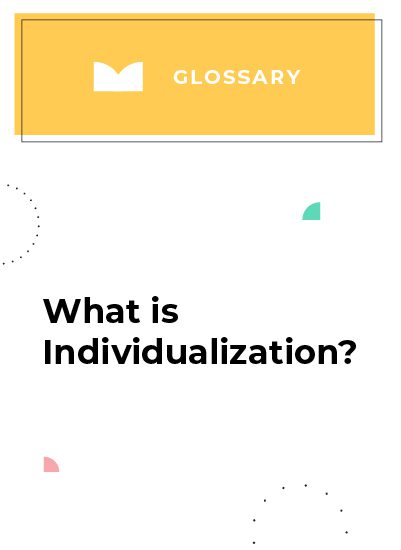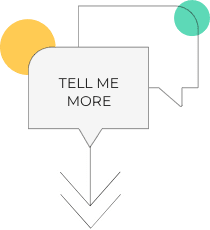
Individualization
What is Individualization?
Individualization is a technique used in personalization strategy to automatically optimize customer experience for each person. It uses rapid data aggregation and analysis, cross-channel deployment, and machine learning to predict customer behavior and adjust to changes faster than marketers can.
What is Individualization in Marketing?
Individualization (also called 1-to-1 personalization) is a technique used in personalization strategy to automatically optimize customer experience for each person. It uses rapid data aggregation and analysis, cross-channel deployment, and machine learning to predict customer behavior and adjust to changes faster than marketers can. This technology can empower you to solve problems that are very difficult to overcome with testing and segmentation alone.
The unprecedented level of relevance for each customer translates into significant revenue boosts and improved customer loyalty, which is why individualization has become the pinnacle to which many brands aspire.
Individualization vs. Personalization in Marketing
Personalization and Individualization are often confused with one another—for very good reasons. The original definition of “personalization” entailed delivering individualized experiences to each individual person. However, at the time in which the term was popularized, few technologies were able to meet that definition. As a result, the marketing industry adopted and promoted a narrower definition that entailed creating partially customized experiences through the use of customer segmentation and product recommendation algorithms. Since then, newer technologies have been developed that enable customer interactions that more closely conform to the original definition, but instead of redefining the personalization more broadly, newer terms like 1-to-1 Personalization, Personalization 2.0, Individualized Personalization or Individualization have been developed.
Individualization does not replace segmentation-based personalization but rather adds value to a broader personalization strategy. Top brands that succeed in customer experience and personalization use a combination of three different ways to achieve personalized customer experiences: optimization, segmentation, and individualization. All three approaches are used, in varying combinations, to achieve a brand’s personalization goals. In fact, the synergy of opportunities and capabilities between them is strongest when they are used in conjunction with one another.
Each of these three personalization techniques has a specific and valuable purpose:
- Testing and Optimization enable learning and tailoring of messages over time
- Segmentation and Targeting improve the relevance of a brand’s message by taking into account key distinctions in audience groups
- Individualization drives individualized experiences and results
Compared to testing and segmentation, individualization goes a step further by offering a solution to their two greatest limitations: delayed results and inability to scale. In doing so, it represents a fundamentally different approach. The unprecedented level of relevance for each customer translates into significant revenue boosts and improved customer loyalty, which is why individualization has become the pinnacle to which many brands aspire.
Individualized Personalization Example
Office Depot is one of the largest online retailers in North America and eCommerce is a critical component of their business. Over the years they’ve adopted a forward-thinking approach that reflects this priority by utilizing testing and segmentation to improve customer experiences. Though their efforts had helped them achieve notable results, they also recognized the inherent limitations of those methods. They realized that they needed to go beyond testing and segmentation in order to better satisfy the individual needs of their unique customers. So they turned to individualization.
One example of how their new approach helped them orchestrate more sophisticated personalized experiences is in their handling of Product Description Pages (PDPs). PDPs hold a wealth of information—including product information, pricing, promos, reviews, and related products. But when presented all at once, too much detail can actually make it harder for customers to find the information they need in the moment.
Ideally, the top of the PDP would always contain the information that a customer needed at that point in time. Less vital information would be presented further down the page. The only way to do that is to automatically, in real time, predict what each visitor on a PDP needs, and present it.
This problem is a great fit for individualization: real-time, complex, and high value. Office Depot’s eagerness to be an early adopter paid off quickly: within just four months, they saw $6.9M increase in revenue. To learn more about Office Depot’s success with individualization, you can read our case study here.
How Individualization in Marketing Works
Individualization leverages Artificial Intelligence (AI) technology to deliver a personal experience to each customer based on all the data that is available up to the present moment. By enabling the continuous aggregation of customer preference and behavioral data, machine learning makes it possible to improve the personalized experience for each individual constantly and incrementally.
How to Create Individualized Customer Experiences
To enable brands to create meaningful individualized experiences, the best personalization platforms should deliver on the following key promises:
- Open Architecture — to pull in all data, wherever it sits, about every customer
- Real-Time — data is ingested and used in real time
- AI-driven — AI engine can decide, in real time, what experience each customer should get
- Omnichannel — provide that decision to every touchpoint, whatever system is managing it, including web, app, or in-store
- Marketer friendly — create a full feedback loop so that the engine and the marketer can learn from the results
Monetate’s eCommerce personalization platform makes it easy to test and optimize, segment and target, and even create true 1-to-1 experiences. With all this in one personalization solution, marketers have the flexibility to leverage proven approaches to improve the customer experience across web, email, mobile apps, in-store, and other touch points.
